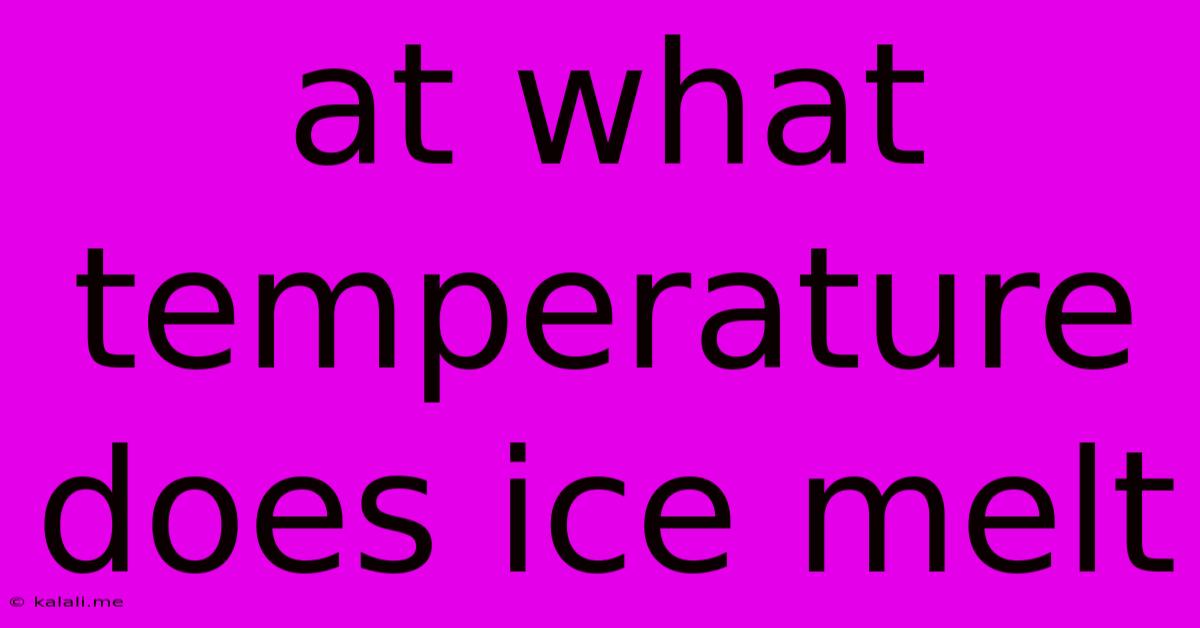At What Temperature Does Ice Melt
Kalali
May 22, 2025 · 3 min read

Table of Contents
At What Temperature Does Ice Melt? A Deep Dive into the Science of Melting
Meta Description: Discover the exact temperature at which ice melts and explore the factors that can influence this process, including pressure and impurities. Learn about the fascinating science behind phase transitions and how this simple process impacts our world.
Ice melting might seem like a simple process, but understanding the exact temperature at which it occurs and the factors influencing it reveals a fascinating glimpse into the world of physics and chemistry. While the short answer is 0° Celsius (32° Fahrenheit), the reality is a bit more nuanced.
The Fundamental Point: 0°C (32°F)
At standard atmospheric pressure (1 atmosphere), ice melts at precisely 0° Celsius or 32° Fahrenheit. This is the melting point of water, the temperature at which the solid (ice) transitions to the liquid (water) phase. This temperature is a crucial benchmark in many scientific fields and everyday life.
Factors Affecting the Melting Point
While 0°C is the standard, several factors can subtly influence the melting point of ice:
-
Pressure: Increasing pressure actually lowers the melting point of ice. This is a unique property of water, unlike most substances where increased pressure raises the melting point. This phenomenon is why ice skates work – the pressure exerted by the blade on the ice lowers the melting point, creating a thin layer of water that allows for smooth gliding.
-
Impurities: Dissolved substances in water, such as salt, lower the freezing point (and consequently, the melting point) of the water. This is why salt is used to de-ice roads in winter; the salt lowers the freezing point, preventing ice from forming or melting existing ice. This explains why saltwater has a freezing point slightly below 0°C.
-
Supercooling: Under specific conditions, water can remain in a liquid state even below 0°C. This phenomenon, known as supercooling, requires exceptionally pure water and the absence of nucleation sites (surfaces where ice crystals can form). However, even a tiny disturbance will cause the supercooled water to rapidly freeze.
The Science Behind Melting
The melting of ice is a phase transition, a change in the physical state of a substance. At 0°C, the energy supplied to the ice overcomes the intermolecular forces holding the water molecules in a rigid crystalline structure. These molecules gain enough kinetic energy to break free from their fixed positions and move more freely, resulting in the liquid state.
This process is endothermic, meaning it absorbs energy (heat) from the surroundings. The energy absorbed is used to break the hydrogen bonds between water molecules in the ice crystal lattice. This explains why a melting ice cube can cool down a drink.
Practical Applications and Everyday Relevance
Understanding the melting point of ice is crucial in various applications, including:
- Weather forecasting: Predicting ice formation and melting is essential for accurate weather forecasts and warnings.
- Food preservation: Freezing food relies on lowering the temperature below the freezing point of water to preserve it.
- Civil engineering: Knowing the impact of temperature on ice is critical for designing structures in cold climates.
- Material science: The study of phase transitions, including melting, is vital in the development of new materials.
In conclusion, while the simple answer to "At what temperature does ice melt?" is 0°C (32°F), the process is significantly influenced by pressure and impurities. This seemingly straightforward phenomenon is a rich example of the complex interplay of physical forces and has wide-ranging implications across various scientific disciplines and everyday life.
Latest Posts
Latest Posts
-
What Is The Symbol For Inches
May 22, 2025
-
How To Remove Old Sealant From Bath
May 22, 2025
-
Glue For Bonding Metal To Plastic
May 22, 2025
-
How To Remove Ink Off Of Paper
May 22, 2025
-
Level Up Fast In Fallout 4
May 22, 2025
Related Post
Thank you for visiting our website which covers about At What Temperature Does Ice Melt . We hope the information provided has been useful to you. Feel free to contact us if you have any questions or need further assistance. See you next time and don't miss to bookmark.